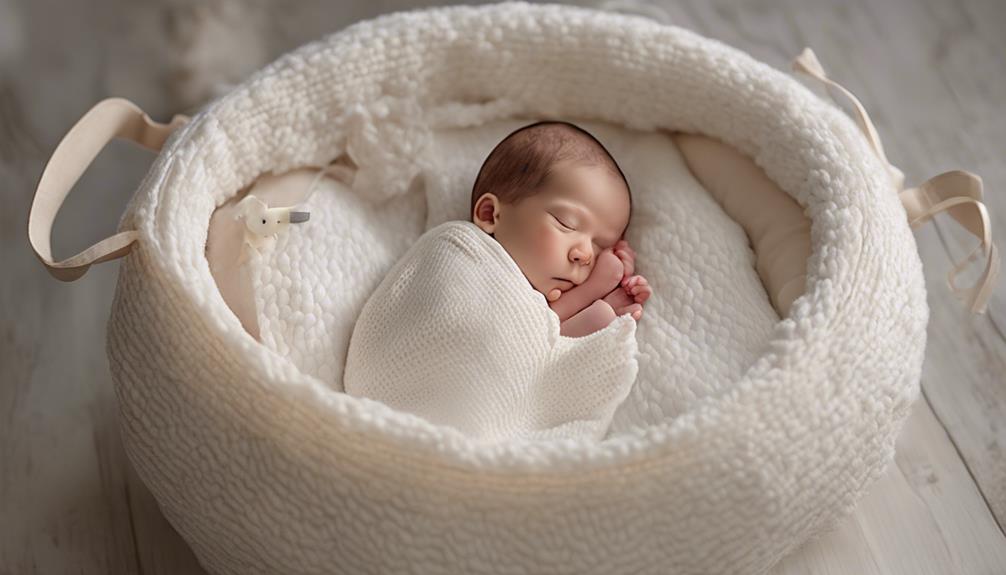As caretakers, we are all too familiar with the challenge of handling newborns who have perfected the skill of spitting up while asleep. It can be a messy and occasionally exasperating situation.
However, have you ever wondered why this happens so frequently? What are the underlying reasons behind these unexpected eruptions from our little ones?
Let's uncover the mysteries behind the 7 common causes of newborns spitting up in their sleep and gain a deeper understanding of what might be going on with our tiny sleepers.
Key Takeaways
- Newborns spit up in sleep due to underdeveloped lower esophageal sphincter.
- Elevating the crib head can reduce spit-up incidents during sleep.
- Proper positioning after feeding helps prevent spitting up while sleeping.
- Addressing food sensitivities can minimize discomfort and reduce spit-up in newborns.
Immature Digestive System
In newborns, our immature digestive systems often cause frequent spitting up during sleep due to the underdeveloped lower esophageal sphincter allowing stomach contents to flow back up easily. This phenomenon, commonly known as reflux, occurs because the muscles in our tiny stomachs aren't yet fully developed to handle digestion efficiently. When a baby lies flat, especially during sleep, this immaturity can lead to increased episodes of spitting up.
To help reduce the occurrence of reflux during sleep, it's advisable to position the baby in an upright position after feeding. Placing the baby in a slightly elevated position can aid in keeping the stomach contents down and lessen the chances of regurgitation during sleep. Understanding that a baby's digestive system is still maturing can bring comfort to parents when dealing with these frequent episodes of spitting up, knowing that it's a natural part of the developmental process.
Overfeeding
As parents, we comprehend the challenges of gauging the right amount to feed our newborns.
It's essential to contemplate the impact of feeding frequency, bottle size, and timing on preventing overfeeding.
Feeding Frequency Impact
Feeding newborns with care and attention to their cues is essential to prevent overfeeding and subsequent spit-up during sleep. Newborns have small stomach capacities, and overfeeding or feeding too frequently can overwhelm their delicate systems, leading to spit-up episodes. By monitoring their feeding cues and pacing feedings appropriately, caregivers can help reduce the likelihood of spit-up during sleep. Here is a table highlighting the impact of feeding frequency on newborns:
| Feeding Frequency | Impact | Prevention |
|---|---|---|
| Too frequent feedings | Overwhelms digestive system | Monitor feeding cues and space out feedings |
| Overfeeding at once | Small stomach capacity leads to spit-up | Offer smaller, more frequent feedings |
| Ignoring feeding cues | Disrupts baby's natural rhythm | Follow baby's hunger and fullness cues |
Bottle Size Consideration
To prevent newborns from spitting up during sleep, it's important to ponder the appropriate bottle size to avoid overfeeding. Using bottles that are too large can lead to babies taking in more milk than they need, causing spit-up issues. Overfeeding can overwhelm a baby's digestive system, leading to reflux and discomfort during sleep.
To reduce spit-up episodes, consider using smaller bottle sizes and feeding in smaller, more frequent amounts. By paying attention to your baby's cues and avoiding forceful feeding, you can help prevent overfeeding and minimize spit-up problems. Encouraging a slow, paced feeding technique can also aid in reducing the likelihood of spit-up incidents while your little one is sleeping.
Timing of Feedings
Understanding the best timing for feedings is crucial in preventing newborns from spitting up during sleep. Overfeeding before bedtime can overwhelm a newborn's delicate stomach, leading to uncomfortable spit-up incidents. Newborns have limited stomach capacity, making them particularly susceptible to spit-up if fed excessively. By establishing a structured feeding routine with adequate breaks and paying attention to the baby's cues, caregivers can prevent overfeeding and reduce the likelihood of spit-up during sleep. Monitoring feeding patterns and adjusting the timing of feedings accordingly can greatly decrease instances of spit-up, promoting a more comfortable and restful sleep for both the baby and the caregiver.
| Timing of Feedings | Impact on Spit-up |
|---|---|
| Before bedtime | Increases likelihood of spit-up |
| Structured routine | Reduces overfeeding incidents |
| Monitoring cues | Prevents excessive feeding |
| Adequate breaks | Promotes comfortable digestion |
| Adjusting timing | Minimizes spit-up occurrences |
Swallowing Air

During the early stages of life, newborns may inadvertently swallow air, a common factor contributing to their tendency to spit up during sleep. It's important to address this issue to help ease your little one's discomfort.
Here are some key points to keep in mind:
- Proper Feeding Techniques: Ensuring your baby is latched correctly while feeding can help reduce the amount of air they swallow. A good latch promotes efficient milk transfer and minimizes the intake of excess air.
- Burping After Feeding: Making sure to burp your baby after each feeding session can release any trapped air in their stomach. This simple step can greatly reduce the chances of spitting up during sleep by preventing excessive gas buildup.
- Gas Buildup Prevention: Gas in the stomach can be uncomfortable for newborns and may lead to increased spitting up. By focusing on techniques like burping and proper latching, you can help minimize gas buildup and promote better digestion for your little one.
Lying Flat Position
Let's talk about how lying flat impacts newborns' digestion.
When babies sleep in this position, stomach contents can easily flow back into the esophagus, leading to spit-up episodes.
Elevating the head of the crib slightly can help utilize gravity to keep stomach contents down and reduce spit-up incidents.
Flat Surface Impact
Placing newborns on a slightly elevated surface can greatly reduce the likelihood of spit-up incidents during sleep. This simple adjustment can make a significant difference in your baby's comfort and overall well-being. Here are three key points to take into account:
- Elevating the head helps prevent stomach contents from flowing back up, reducing the chances of spit-up.
- The upright position aids digestion and supports the lower esophageal sphincter, minimizing the risk of reflux disease (GERD).
- Following recommendations from the American Academy of Pediatrics and Pediatric Gastroenterology and Nutrition can guide you in creating a sleep environment that promotes better digestion and reduces spit-up occurrences. Remember, a small change in positioning can lead to better sleep for your little one.
Digestive System Development
Understanding the challenges newborns face with their immature digestive systems while lying flat during sleep is important for addressing frequent spit-up occurrences. The lower esophageal sphincter, responsible for preventing stomach contents from flowing back up, isn't fully developed in newborns, making them more prone to spitting up when lying flat.
Gravity plays a role in this process, facilitating the easy movement of stomach contents towards the esophagus. The angle at which a newborn lies can impact the closure of the esophageal sphincter, influencing the likelihood of spitting up.
To help reduce spit-up episodes, keeping newborns in an inclined position during sleep can aid digestion and minimize the effects of gravity on stomach contents, promoting a more comfortable sleep experience.
Airway Positioning Effects
Avoiding the flat position for newborns during sleep is essential to prevent airway compression and reduce the risk of spit-up incidents. Lying flat can lead to regurgitated stomach contents entering the airway, posing a choking hazard.
Elevating the baby's head promotes better digestion, decreasing spit-up episodes. Placing the baby in a slightly inclined position during sleep helps prevent reflux and enhances breathing comfort.
Proper airway positioning is vital in averting respiratory issues linked to newborns sleeping flat. It's vital to prioritize your baby's safety and well-being by ensuring their sleeping position supports optimal airflow and digestion.
Food Sensitivities

When a breastfeeding mother consumes common allergens like cow's milk protein or soy, it can trigger increased spit-up in sensitive newborns during sleep. Proteins from the mother's diet pass into breast milk and can affect the baby's digestion, potentially leading to more frequent spit-up episodes. Identifying and managing food sensitivities is essential in minimizing discomfort and spit-up in newborns while they sleep.
If a newborn shows signs of sensitivity to certain foods, eliminating these allergens from the mother's diet under the guidance of a healthcare provider may help reduce spit-up occurrences.
Understanding the impact of cow's milk protein or soy on a breastfeeding baby's digestion is vital in addressing spit-up issues during sleep. By being mindful of what the mother consumes, we can positively influence the baby's comfort levels and overall well-being. Working closely with healthcare professionals to navigate food sensitivities can lead to a more peaceful and restful sleep for newborns prone to increased spit-up.
Fast Milk Flow

Breastfeeding mothers should be aware that fast milk flow can cause newborns to swallow air along with milk, leading to spitting up during sleep. This can be distressing for both the baby and the parent, but there are ways to address this issue and reduce the likelihood of spitting up incidents. Here are three key points to keep in mind:
- Breastfeeding Techniques: Adjusting your breastfeeding technique can help regulate the flow of milk. Try different positions such as laid-back nursing or side-lying to control the speed at which your baby is receiving milk.
- Burping: Pausing during feeding to burp your newborn can help release any trapped air, reducing the chances of spitting up later on. Burping your baby frequently, especially if you notice they're struggling with fast milk flow, can make a significant difference.
- Paced Feeding: Implementing paced feeding techniques can slow down the milk flow and allow your newborn to feed at a more comfortable pace. This method can help prevent them from swallowing excess air and minimize spitting up during sleep.
Sleep Patterns

Understanding the impact of sleep patterns on newborns' spit-up occurrences is essential for caregivers seeking to provide the best care for their little ones. Newborns have immature digestive systems, making them prone to spitting up, especially during sleep. Sleep patterns play a significant role in this process, with factors such as swallowing air, sleeping in a flat position after feeding, and experiencing sleep disturbances all contributing to increased spit-up incidents.
| Sleep Patterns | Impact on Spit-Up Occurrences |
|---|---|
| Swallowing air | Can lead to more spit-up episodes |
| Flat position | Gravity not aiding digestion can result in increased spit-up |
| Sleep disturbances | Discomfort during sleep may cause more frequent spit-up |
| Movement during sleep | More movement can potentially lead to increased spit-up incidents |
Caregivers should make certain that newborns are positioned correctly after feeding, avoid disturbances during sleep, and create a comfortable sleep environment to minimize spit-up occurrences. By understanding how sleep patterns influence spit-up in newborns, caregivers can provide better care and support for their little ones.
Frequently Asked Questions
Is It OK if My Newborn Spits up in Sleep?
It's generally okay if newborns spit up in sleep, as long as they seem comfortable. Most infants outgrow this as they grow. If the baby is gaining weight and not distressed, occasional spit-up during sleep is common and typically nothing to fret about.
Why Does My Baby Keep Spitting up When Lying Down?
When lying down, babies may spit up more due to pressure on their stomach from the mattress. This position can cause stomach contents to flow back up the esophagus. Elevating the crib head can help reduce these episodes.
Why Does My Baby Spit up in the Middle of the Night?
I empathize with how challenging it can be when babies spit up at night. It may happen due to lying flat, swallowing air, overfeeding, or sensitive tummies. These factors can contribute to nighttime spit-up episodes.
Does Spit up Mean Overfeeding Newborn?
When babies spit up, it doesn't always mean they're overfed. Factors like a relaxed lower esophageal sphincter can contribute. We should consider various causes, not just overfeeding, to understand why newborns spit up during sleep.
How Can I Prevent My Newborn from Spitting Up During Sleep?
Babies often experience the common issue of preventing newborn spitup during sleep. To minimize this, try burping your baby frequently during feedings and keeping them upright while bottle or breastfeeding. Avoid overfeeding and ensure they are sleeping on an inclined surface to reduce spitting up.
Conclusion
To sum up, newborns spit up in their sleep for a variety of reasons, all perfectly normal in the grand scheme of things. So next time you're changing those spit-up covered sheets at 3 am, just remember that it's all part of the joy of parenthood.
Embrace the mess, cherish the moments, and know that this phase will eventually pass. And hey, at least it's not projectile vomiting, right? Just keep those burp cloths handy and keep on trucking through the spit-up storm.










